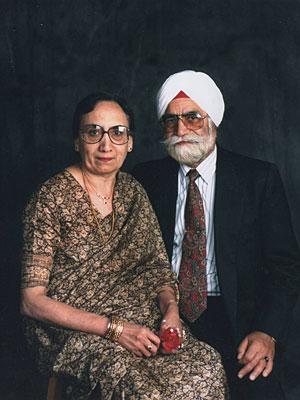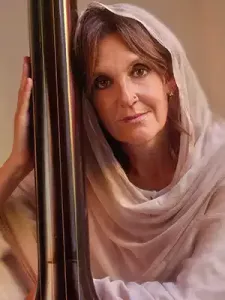
Endowed by Dr. Hakam Singh in honor of his wife, the late Sardarni Harbans Kaur, Hofstra University’s Sikh Musicology Chair is the first of its kind at a western university.
Designed to settle an academic platform for the study of the Gur-Sikh musical heritage, the Sikh Musicology Chair has been held by Dr. Francesca Cassio, professor of music, ethnomusicologist, and kīrtaniya, since it was established in 2011.
Within South Asian music scholarship, Sikh Musicology is a new field of study that focuses on the history and analysis of repertoires associated with the spiritual practices established during the Sikh Gurus' era (late 15th-early 18th centuries). A rich body of traditional compositions was orally transmitted until the mid-20th century when - due to the Post-Partition upheaval - the Sikh community was disrupted, along with its musical legacy. The plethora of musical arrangements in which the lyrical hymns are set today is the sonic portrait of historic shifts in the Sikh culture from the pre-colonial to the modern, and post-colonial era, until the present times of globalization.
News
The Sikh Musicology Chair is located in the Hofstra Music Department. Courses are regularly offered to develop an appreciation of the Gur-Sikh musical tradition, through the aural and oral training of the repertoire and the study of the cultural context in which it developed. Classes encompass an introduction to the theoretical, historical and cultural aspects, followed by the vocal and instrumental practice of basic repertoires. Among the activities of the Sikh Musicology Chair are lectures and concerts by visiting scholars, independent studies, research projects, and ethnographic fieldwork.
About the Kaur Endowed Chair
The Sardani Harbans Kaur Chair in Sikh Musicology, established by Dr. Hakam Singh in memory of his wife, facilitates the intellectual pursuit of music’s longstanding role in the Sikh tradition. As the first of its kind in the United States, the chair shares that rich heritage with the next generation of students.
A renowned chemist and professor with nine U.S. patents to his name, Dr. Hakam Singh is also an intellectual luminary in the international Sikh community. Dr. Singh immigrated to Los Angeles, California, in 1967 after completing postdoctoral research at the University of Southern California and a professorship at IIT New Delhi. While progressing in his scientific career, he advanced the intellectual pursuit and global understanding of the Sikh faith. His academic contributions to Sikhism include numerous articles as well as books on Guru Tegh Bahadur as an apostle of human rights and a study on the mystic Indian poet Kabir.

Dr. Hakam Singh and his wife of 57 years, Harbans Kaur, shared an intellectual and devout appreciation for the hymns of the Sikh faith. “There are about 6,000 hymns or shabads in the Sikh scripture and each shabad is preceded by instructions as to what raga and musical measure or taal it should be sung in,” shares Dr. Singh. “This shows that our founders not only had a great knowledge of Indian music, but that they knew the influence of the singing of hymns on the mind.”
Inspired by Sardani Harbans Kaur’s lifelong appreciation for Sikh music, Dr. Singh established the Hofstra University Chair in Sikh Musicology in her name in 2008.
Courses
MUS 17. Intro to Sikh Music
Through an experiential engagement with heritage songs from the Sikh tradition (Gurbānī Sangīt), this course explores the musical literature, the instruments, and the practices established from the time of the Sikh Gurus (16th-18th centuries) to the present day. Examining Gurbānī Sangīt as an indigenous system where the ‘musical’ and the ‘literary’ constituted a unified experience to embody knowledge, this class offers an appreciation of Sikhi(sm) through a musical lens, with the study of raga-based kirtan repertory.
Intro to Sikh Music is an AA and CC distribution class and a Music History elective, suitable to students who want to partake in multidisciplinary studies that involve any of the following areas:
Music, Religion, Anthropology, Global Studies, South Asian Studies, and Eastern Philosophies.
This class is an opportunity to:
- Discover a lesser-known page of South Asian music history
- Approach Sikh philosophy and history through the analysis of the śabads from the Gurū Granth Sāhib
- Develop a critical listening and be able to distinguish the different forms of kīrtan
- Learn heritage Gurbānī hymns, set to rāga and tāla
- Play traditional instruments
- Experience singing as embodied knowledge, and its transformative power.
MUS 151 Independent Study
The Independent Study is a one-to-one class that provides students with the opportunity to deepen their knowledge by way of doing original research on specific topics that range from the history of Gurbani Sangit to the contemporary diaspora, to the vocal and instrumental practice of heritage repertories.
Events
Concerts, Performances & Workshops
See events hosted as part of Sikh Musicology at Hofstra.
Faculty

Francesca Cassio
The Sardarni Harbans Kaur Chair of Sikh Musicology and Professor of Music
516-463-5533
Email
Sardarni Harbans Kaur Chair in Sikh Musicology
Francesca Cassio, Ph.D.
Professor of Music
New Academic Building 102
(516) 463-5533

